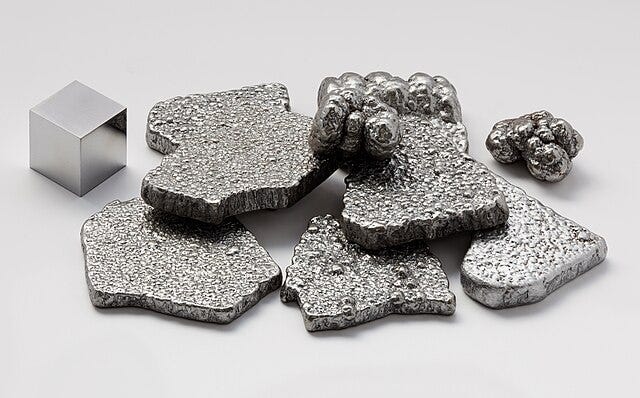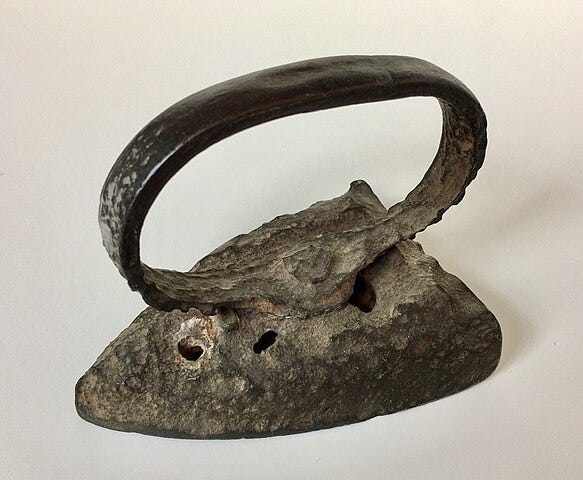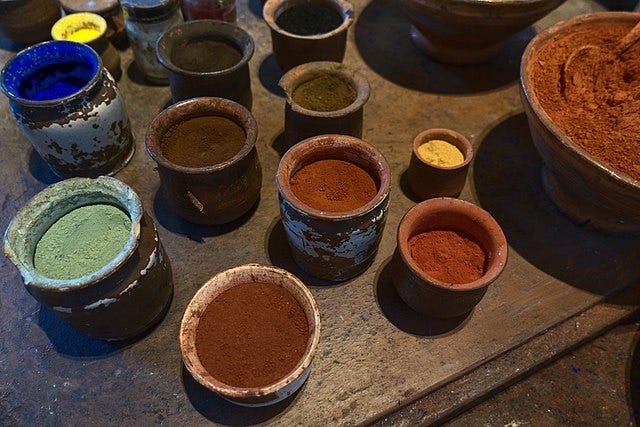Dear Gentle Readers,
I’m delighted to announce that my second book, On Opium: Pain, Pleasure, and Other Matters of Substance, is now available on Spotify in its audiobook version. I’d be so happy to see my under-the-radar labour of love about pain, drugs, capitalism, solidarity and much else get around. Please read (or listen, or both), argue, enjoy, and share. Your advocacy of my work makes all the difference in the world to its continued existence, and to my ability to keep publishing.
This week I received an iron infusion (and hopefully not my third covid infusion, given that it involved hours in a small, under ventilated room with unmasked, high-risk patients and staff). Still waiting to find out if it produces the hoped-for magical effects on a variety of symptoms of ambivalent cause. Anyway, it offers me a good excuse to give your one of my favourite kinds of Live More Lives, the randomly-inspired one. Perhaps this is why I ended up as a writer and freelance journalist, becoming an instant pseudo-expert in a subject before moving on like a bee to other intellectual flowers.
In the past months I have learned about Alzheimer’s Disease, the gross anatomy of the gorilla and other primates, vocal flexibility in young chimpanzees and humans, an interesting drug for the treatment of addiction, how organ transplants work in the United States, human evolution in Africa, the nature of space and time, and the elements that make up everything down here on earth and up there (so to speak, there being really no up or down) in space. Although I’m paid for these attempts at instant expertise—each bit of which tends to lead to new, tangentially related areas of interest and study—I would do it on my own. A look at the floor of my bedroom/office will either cause you to faint or provide the delight of a large collection of fiction—owned, borrowed, and adopted from the local Little Free Libraries that have turned my daily walks into happily book-focused free shopping sprees—and non-fiction that attests to the randomness or diversity of my interests.

All the algorithms that nudge you to buy things like the things you already buy fail to capture this desire to know a bit about everything and to be exposed to a little of everything the world has to offer.
Curiosity, I have long felt, is the saving grace of personal attributes, the one that leaves only in profound depression and that makes a person interesting by being interested, that gets the bearer through the most terrible of circumstances and the most pleasantly banal. I imagine that many of you, who have stuck with me for nearly a year of this, share this attribute, and I thank you for giving some of that mercurial attention of yours to my writing once a week.
Anyway, back to the elements that make up everything. So I am awaiting my Magneto or Iron Man superpowers, but in the meantime, it occurs to me that the element Fe, iron, brings many literary associations to my mind, and that I’d like to share some of them with you.
The Periodic Table: Iron
The first is an old beloved writer to whom I have turned during the agony of the Hamas attack on civilians in Israel followed by Israel’s month-long (so far) US-backed retaliation against the majority under-18 population of Gaza, its hospitals, its refugee camps, its ambulances, a set of norm-defying actions that I simply cannot see as strategic in the sense of advancing the security of Israelis or of any Jewish person on earth, and that is if we were to focus only on these populations and their welfare, and not also on the captive, civilian Muslim majority and Christian minority populations in Gaza, whose wholesale destruction and forced resettlement are reminiscent of only the very most extreme and rapid ethnic cleansings in history.
I don’t know what Primo Levi would have thought of this. Would he, as a humanist and an Italian partisan who took up arms (poorly) against the Fascists1 in what was, in 1943, German-occupied Italy, have seen the plight of Palestinians in what amounts to a large ghetto and condemned collective punishment of Gazans regardless of the nature of the armed resistance group that lives among them? Or, as a Jew who survived eleven months at Auschwitz before being liberated by the Soviet Red Army and spending nine months finding his way home through a devastated Europe, would he have argued that Israel’s Netanyahu-led response was the only and correct, if sad, way of defending the Jewish population of Israel, or perhaps even the idea of a Jewish (ethno-)state? I don’t know.
But Levi writes both eloquently and forensically about humans under extreme conditions, he writes about the retention of humanity and the loss of humanity under such conditions, he writes about the universality of humanity, both in its good and its bad characteristics, and he writes about human dignity, which is the birthright of every human being2, and regardless of what he would think now, I cleave to these as I condemn Israel’s actions against an innocent and, in practice, defenceless population not responsible for the Hamas massacre. In The Periodic Table, Levi describes iron as, like copper, “easy and direct, incapable of concealment”. So too is his friend Sandro, as different from him as anion from cation.

I devoted most of an early Live More Lives to Levi’s beautiful, moving portrait of Sandro Delmastro—easy and direct, incapable of concealment, vigorous and elemental as iron itself—who ultimately joined the anti-Fascist Resistance with the Piedmontese Military Command, and was the first member to be killed, by one of the young teenagers Mussolini recruited from reformatories, the contemporary version of ‘juvie’.
Since I have already shared a long quotation about Sandro, I will select another part of this chapter of The Periodic Table, the chapter entitled “Iron”. Though I must, because it speaks so accusatorially to me, add that Sandro did not belong, as Levi tells us with his usual wry humour, “to that species of persons who do things in order to talk about them (like me)”.
*Please note that “(like me)” is Levi’s parenthesis, not mine, though of course I’m more of a Levi, in this unimpressive respect, than a Sandro.
A comradeship was born, and there began for me a feverish season. Sandro seemed to be made of iron, and he was bound to iron by an ancient kinship: his father’s fathers, he told me, had been tinkers (magnín) and blacksmiths in the Canavese valleys: they made nails on the charcoal forges, sheathed wagon wheels with red-hot hoops, pounded iron plates until deafened by the noise; and he himself when he saw the red vein of iron in the rock felt he was meeting a friend.
On the further role of this element in Levi’s own life, iron-cesium rods he later stole from the Buna rubber factory where—a chemist who quickly acquired good German—he worked as a slave while at Auschwitz, provided him with material from which to whittle cigarette lighters that became currency bartered for bread, which helped keep him alive until he was liberated.
If my frequent returns to Primo Levi’s writing haven’t inspired you yet, I do urge you to seek out first the charming and wise The Periodic Table, and then his masterworks, which are very difficult, formative reading: If This is a Man/The Truce and The Drowned and the Saved, in which (if you’ll excuse a timely digression) he writes, of German concentration camps and the Fascism that led to them,
And there is another, vaster shame, the shame of the world. It has been memorably pronounced by John Donne, and quoted innumerable times, pertinently or not, that "no man is an island," and that every bell tolls for everyone. And yet there are those who, faced by the crime of others or their own, turn their backs so as not to see it and not feel touched by it. This is what the majority of Germans did during the twelve Hitlerian years, deluding themselves that not seeing was a way of not knowing, and that not knowing relieved them of their share of complicity or connivance.
Primo Levi notes that, after Auschwitz, “a similar tragedy, almost ignored in the West, did take place, in Cambodia, in about 1975,” and argues that over the next ‘ten or twenty years’ (of course, long past, since he wrote this shortly before his death by probable suicide in 1987),
a mass slaughter is particularly unlikely in the Western world, Japan, and also the Soviet Union: the Lagers of World War II are still part of the memory of many, on both the popular and governmental levels, and a sort of immunizational defense is at work which amply coincides with the shame of which I have spoken.
But he argues that the factors that coincided in Germany to produce the Holocaust were few in number, that they are “indispensable but insufficient if taken singly”, and that “these factors can occur again and are already recurring in various parts of the world.” And so, he suggests, it is not so unlikely that—though Levi refuses to speculate beyond the twenty-year time frame—
other slaughters will take place, unilateral, systematic, mechanized, willed, at a governmental level, perpetrated upon innocent and defenseless populations and legitimized by the doctrine of contempt.
As I read this, such a thing can, in his view, occur again, even if the details are vastly different, and in fact it has occurred, though the details are different, both within his predictive timeframe, and since. Of the ‘saved’— those survivors like himself, who are only imperfect witnesses, speaking for the ‘drowned’ by proxy, unable to provide direct testimony all the way to the end3—Levi writes, their lived knowledge of what humans can do could never be erased:
Never again could it be cleansed; it would prove that man, the human species—we, in short—had the potential to construct an infinite enormity of pain, and that pain is the only force created from nothing, without cost and without effort. It is enough not to see, not to listen, not to act.
Age of Iron
Another writer who has been formative for me and who I bring up frequently here is J.M. Coetzee, specifically his earlier novels. Age of Iron, the title of one of these, refers to the brutality that enters the soul of both oppressor and resistance in a world like that of apartheid South Africa, and asks how and whether such a stalemate can be overcome. As John Freeman wrote in a good, recent (2019) essay about the 1990 book, in it Coetzee asks, “What if witnessing and denouncing the crimes of governments isn’t enough? What are we willing to give up to make them stop?”
The protagonist, Elizabeth Curran, is a retired Classics scholar dying of cancer. She is alone in South Africa, other than the curious household—vagrant and worker and worker’s rebellious children—that forms in her house over the course of the novel, her daughter having left the indefensible apartheid state and emigrated to the United States. After Curran’s (Black) maid’s teenage son and his friends beat up the (white) homeless man who has taken refuge in the elderly liberal (white, theoretically anti-apartheid) protagonist’s home, she thinks:
The age of iron. After which comes the age of bronze. How long, how long before the softer ages return in their cycle, the age of clay, the age of earth? A Spartan matron, iron-hearted, bearing warrior-sons for the nation. “We are proud of them.” We. Come home either with your shield or on your shield.
The ‘Spartan matron’ is Florence, Curran’s maid (housekeeper—in apartheid South Africa the term for an adult female worker in the home was ‘maid’. The male gardener, whatever age he was, was the garden ‘boy’). But Elizabeth Curran is also iron-hearted, despite her liberal sympathies: she has bars on her windows, she employs the ‘help’ affordable and normalized due to the inequities maintained by apartheid4, and she never moved to active opposition of the apartheid system which has hardened into tyranny met with flagrant violence (Freeman describes this all nicely in his Lithub essay, linked above).
Coetzee writes, of such times:
For each of us there is a case to be made. We all deserve the benefit of the doubt.
But there are times when there is no time for all that close listening, all those exceptions, all that mercy. There is no time, so we fall back on the rule. And that is a great pity, the greatest pity. That is what you could have learned from Thucydides [the protagonist is a retired Classics scholar, hence the reference]. It is a great pity when we find ourselves entering upon times like those. We should enter upon them with a sinking heart. They are by no means to be welcomed.

Ironweed
My parents had a novel around the house that I picked up several times, having eventually read pretty much everything on the shelves. But I never understood the tone or meaning of the book, Ironweed, by William Kennedy. I don’t know that I want to go back to figure it out, but this appraisal by Sam Jordison in The Guardian encourages me, quoting as it does a gorgeous paragraph of review by critic Donald Newlove, who writes of Ironweed,
I, for one, enter the heaven of a writer absolutely on top of his material from the first sound of his voice. His load is light, every page. Pure light. And surely he changes our lives, enriches our understanding of the madness of one drunk in a fellowship of rock-bottom boozers during the Great Depression. It’s not just historical understanding he gives us. We become Francis Phelan, a deep-witted walking grave, lighted up with family ghosts like fireflies in twilight.
And indeed, it seems worth trying it again, as an adult who maybe understands the material better than I did back in childhood. Here Francis imagines his own conception:
Francis watched this primal pool of his own soulish body squirm into burgeoning matter, saw it change and grow with the speed of light until it was the size of an infant, saw it then yanked roughly out of the maternal cavern by his father, who straightened him, slapped him into being, and swiftly molded him into a bestial weed. The body sprouted to wildly matured growth and stood fully clad at last in the very clothes Francis was now wearing. He recognized the toothless mouth, the absent finger joints, the bump on the nose, the mortal slouch of this newborn shade, and he knew then that he would be this decayed self he had been so long in becoming, through all the endless years of his death.
The weed, of course, is ironweed. You can make a tea of it. There’s a moth that also bears its name. Here’s the plant itself:

I think I’ll give Ironweed another try. But for now I will simply wait for my magic powers to emerge.
On the subway I’ve been reading (still, and only) Mircea Cărtărescu’s Solenoid (remarkable though I still find it, I am starting to think a good editor might have chopped off a few hundred pages that seem to excessively revisit the same ideas). At the infusion clinic, I read Kate Zambreno’s pandemic meditation, The Light Room: On Art and Care. While on hold endlessly while trying to sort out some mundane problem or other, I kicked back and read Nicholson Baker’s House of Holes: a book of raunch (much fun, though I’ve enjoyed a good part of it several times but mysteriously never finished it. Here’s a good review of that one). While waiting for my electric toothbrush to finish brushing my teeth, I’ve read a good bit (in two-minute increments) of Patrick Modiano’s Invisible Ink. Reading is an excellent thing to do while you wait.
I hope you have many fruitfully bookish waiting experiences this week. Or even better, just good reading without all that.
-Carlyn
Here Levi links chemistry with incipient anti-Fascism: “Chemistry, for me, had stopped being such a source. It led to the heart of Matter, and Matter was our ally precisely because the Spirit, dear to Fascism, was our enemy; but, having reached the fourth year of Pure Chemistry, I could no longer ignore the fact that chemistry itself, or at least that which we were being administered, did not answer my questions.”
He writes: “The things I had seen and suffered were burning inside of me; I felt closer to the dead than the living, and felt guilty at being a man, because men had built Auschwitz, and Auschwitz had gulped down millions of human beings, and many of my friends, and a woman who was dear to my heart.”
“The destruction brought to an end, the job completed, was not told by anyone, just as no one ever returned to describe his own death.”
Though it should be noted that such inequities largely remain, as the ruling African National Congress abandoned its guiding socialist beliefs in terms of policy, instead promoting neoliberal economic policy that has allowed for the emergence of a Black middle class but the continued impoverishment of the Black majority (although the ANC has maintained at least symbolic ties with the unions and Communist party that were their allies back when they were considered a terrorist group, not a political party).



